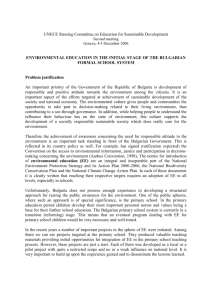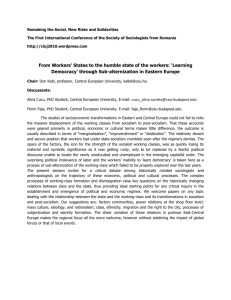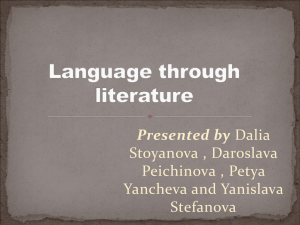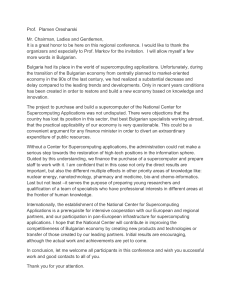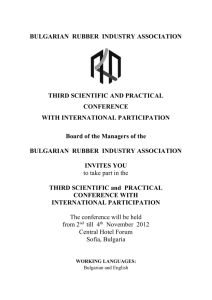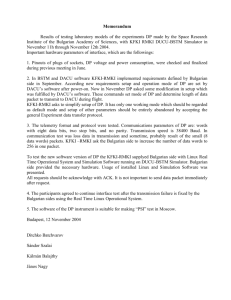“Post-Socialisms”: Continuities and Ruptures between Socialism and Post-Socialism
advertisement
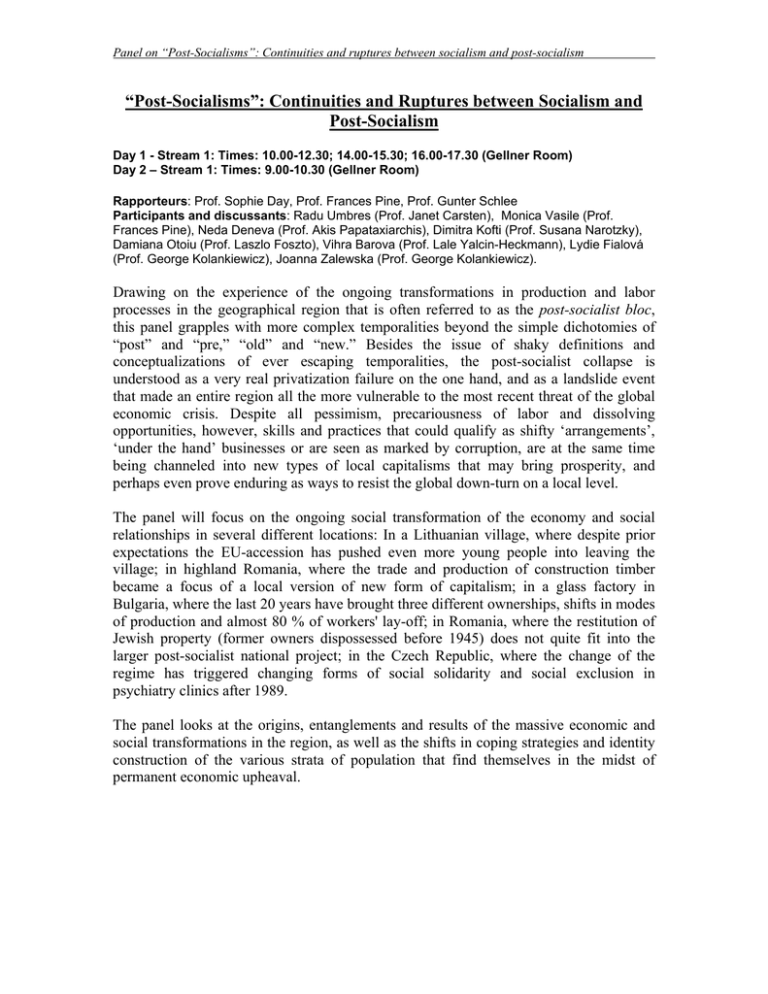
Panel on “Post-Socialisms”: Continuities and ruptures between socialism and post-socialism “Post-Socialisms”: Continuities and Ruptures between Socialism and Post-Socialism Day 1 - Stream 1: Times: 10.00-12.30; 14.00-15.30; 16.00-17.30 (Gellner Room) Day 2 – Stream 1: Times: 9.00-10.30 (Gellner Room) Rapporteurs: Prof. Sophie Day, Prof. Frances Pine, Prof. Gunter Schlee Participants and discussants: Radu Umbres (Prof. Janet Carsten), Monica Vasile (Prof. Frances Pine), Neda Deneva (Prof. Akis Papataxiarchis), Dimitra Kofti (Prof. Susana Narotzky), Damiana Otoiu (Prof. Laszlo Foszto), Vihra Barova (Prof. Lale Yalcin-Heckmann), Lydie Fialová (Prof. George Kolankiewicz), Joanna Zalewska (Prof. George Kolankiewicz). Drawing on the experience of the ongoing transformations in production and labor processes in the geographical region that is often referred to as the post-socialist bloc, this panel grapples with more complex temporalities beyond the simple dichotomies of “post” and “pre,” “old” and “new.” Besides the issue of shaky definitions and conceptualizations of ever escaping temporalities, the post-socialist collapse is understood as a very real privatization failure on the one hand, and as a landslide event that made an entire region all the more vulnerable to the most recent threat of the global economic crisis. Despite all pessimism, precariousness of labor and dissolving opportunities, however, skills and practices that could qualify as shifty ‘arrangements’, ‘under the hand’ businesses or are seen as marked by corruption, are at the same time being channeled into new types of local capitalisms that may bring prosperity, and perhaps even prove enduring as ways to resist the global down-turn on a local level. The panel will focus on the ongoing social transformation of the economy and social relationships in several different locations: In a Lithuanian village, where despite prior expectations the EU-accession has pushed even more young people into leaving the village; in highland Romania, where the trade and production of construction timber became a focus of a local version of new form of capitalism; in a glass factory in Bulgaria, where the last 20 years have brought three different ownerships, shifts in modes of production and almost 80 % of workers' lay-off; in Romania, where the restitution of Jewish property (former owners dispossessed before 1945) does not quite fit into the larger post-socialist national project; in the Czech Republic, where the change of the regime has triggered changing forms of social solidarity and social exclusion in psychiatry clinics after 1989. The panel looks at the origins, entanglements and results of the massive economic and social transformations in the region, as well as the shifts in coping strategies and identity construction of the various strata of population that find themselves in the midst of permanent economic upheaval. Panel on “Post-Socialisms”: Continuities and ruptures between socialism and post-socialism Radu Umbreş: Death and the Regeneration of Amoral Familism In this paper I will discuss the mortuary institutions in a Romanian village and their position in larger social mechanisms. The mental and public representations and actual practices related to death are described and analysed as parts of larger social causal chains of kin relationships. The ethnographic material supports a development of Maurice Bloch and Jonathan Parry's theory of the role of funeral rituals in social reproduction. The analysis takes on the classical themes of amoral familism and limited good approach and includes them into a dynamic model of transformation and reproduction of social relations. Monica Vasile: Capitalism meets Post-Socialism: Timber Trade in the Highlands of Romania Drawing on older and more recent fieldwork in the highlands of Romania, I will explore trade and production of construction timber. The paper will focus on the social relationships formed in the local communities, trying to point to the social construction of the economy. I will follow practices which enable individuals, or rather ‘houses’ to perform economic activity, such as reciprocating work, closing informal deals, selling on trust, giving clients to the neighbor, and choosing wealthy and ‘important’ godparents. In this way, houses specialize and form a network that makes the whole village resemble a timber factory and market. Skills and practices that would qualify as specific for the post-socialist period, termed as ‘arrangements’, ‘under the hand’ or ‘corrupt’, flourish as capitalist businesses after the fall of communism. This type of local capitalism brings prosperity, which apparently also resists the crisis. Neda Deneva: Everyday Citizenship in Migration Context: Bulgarian Muslims and the State/s in-between Bulgaria and Spain The presentation aims to address the issue of everyday relations and imaginings of the state/s of Bulgarian Muslim migrants in Spain. As a specific culturally and economically marginalized minority group, Bulgarian Muslims have developed a particular relationship with the Bulgarian state, which is translated and complemented in yet another ambiguous position they have taken in Spain. Living transnational lives, migrants have to deal on a daily basis with different institutions and state-created and imposed categories. Based on extended ethnographic fieldwork in a Bulgarian Muslim migrants’ community both in Bulgaria and Spain, I look at the way migrants experience and negotiate their embeddedness on the margins of two states. I discuss the welfare provisions and the everyday interactions which migrants and their extended families at home experience. In addition to that, I also look at the related discourses and images of Panel on “Post-Socialisms”: Continuities and ruptures between socialism and post-socialism the two states - the Spanish and the Bulgarian - and the creation of a concept of the ideal state. Thus the relationship with the state is approached as a dual interaction, expressed in definitions/categorisations, practices/interactions and discourses/imaginings. My main argument is that migration is conceived by the Bulgarian Muslims as an empowering experience which is expressed in a detachment and a tactic of circumventing the (Bulgarian) state. While trying to escape from the margins of the Bulgarian nation-state, they end up on the margins of yet another state, being in the position of immigrants, low-skilled workers, and Muslim. Nonetheless, at the everyday level of interaction, the institutional context, the type of contracts and welfare provisions which Bulgarian Muslim migrants receive in Spain open up spaces for acquiring a type of social citizenship which they have always lacked at home. In this sense, the everyday state, through which categories are worked into practices, offers a kind of social citizenship in practice. In addition to discussions of citizenship practices and conceptualizations, I develop a critical analysis of the construction and uses of ethnicity as a marker of identification and exlore further the group name-producing category. More specifically, I go into greater detail on the name choice of ”Bulgarian Muslims”, and the arguments and implications of this analytical choice. This issue is planned as the closing chapter of my thesis which will wrap up the analytical thread discussed in several previous chapters: personal identification, group naming and categorization in a historical perspective and in the migration context at present, social and everyday citizenship, and relations with the state on discoursive and practical level. Dimitra Kofti: ‘Everything is New, but Everything is the Same’: Renegotiating ‘Crisis’ and Power in a Post-socialist Bulgarian Factory Based on fieldwork (2008-2009) in Mladost, a privatised factory in Sofia, Bulgaria, this paper focuses on workers’ discourses on continuous transformations of production politics. This factory, with its ongoing changes of ownership, managerial practices and machinery, provides ethnographic views on employees’ coping strategies, formation of various temporalisations and re-evaluations of past and present power relationships emerging after privatisation. As a starting point for this paper, I take the Bulgarian prime minister’s visit to the plant in the winter of 2009, during the ‘financial crisis’, in the midst of the European ‘gas crisis’ and the following energy-cut at the production, which was a period of widespread stress and insecurity among workers and managers. The energy-cut not only contributed to a fear of job losses but also reminded of other experiences of ‘crisis’ and hardship over the last decades, and opened up discussions at the shop floor through the circulation of bitter jokes that the ‘crisis has not arrived now, it was always here’. The prime minister’s attempt to appear in public as being close to the labour force reminded many employees of previous socialist performances of politics. This event and its media representations offered the ground for Panel on “Post-Socialisms”: Continuities and ruptures between socialism and post-socialism employees to discuss performances of managerial and political power and ways in which old and new political realities are reworked during ‘one more crisis’. Through investigating these responses to ‘crises’, this paper aims to unfold relations, continuities and discontinuities to employees’ understandings of neoliberal and socialist politics of production and labour in an attempt to explore what contributes to the often heard complaint - mostly at the lower levels of the factory’s hierarchy - that ‘everything is new, but everything is the same’. Damiana Otoiu: Property Restitution and “(Ethno)national” Political Discourses and Projects in Postcommunist Romania. The Case of the Jewish Community After the breakdown of the socialist regime, the restitution of nationalized properties became a key issue on the political agenda of Central and Eastern European countries. However, the first restitution laws privileged the majority population, while excluding the non-citizens, the non-residents, the formers owners dispossessed before 1945, and the associations and organizations of the “religious and ethnic minorities”. The main aim of this paper is to explore, from a comparative perspective, the "reconstruction of property" in post-socialist Romania through the investigation of the policies concerning Jewish properties. I envisage my study as an illustrative case, which may foster a wider reflection on how the process of reprivatisation intersects with “ethno-national” political discourses and projects. My working hypothesis is that the policies concerning the restitution of private property after the fall of the socialist regime contributed not only to the redistribution of economic resources, but also to the (re)creation of a political community. Restitution laws are, as remarked by Avineri, “not only a victory of norms of private property over communist ideology and practice, but also as a vehicle for the construction of post-communist national identity” (Avineri 1993: 35). This “special nexus among state, property, and national identity” (Verdery 1998: 298) is a opinio communis of the literature on the restitution of expropriated properties, but continues to be an under-studied aspect of the problem (see, however, Karn 2006, Otoiu 2007, Buchowski 2009). My analysis builds on two distinct, yet interrelated, approaches. First of all, my research deals with the legislation area, i.e. the means by which (to use Claus Offe’s terms, Offe 1997: 85) “the dilemmas of justice in post-communist transitions” were resolved in Romania. The hypothesis is that the legal redefinition of private property on restitution could tell us something about how the political elite “ethnified” restitution policies. Following Offe, I understand by ethnification of policies that “policies are proposed, advocated and resisted […] in the name of fostering the well-being of an ethnic community at the expense of excluding those internal and external groups who are not considered to belong to it.” (Offe 1997: 51). Secondly, my research will consider how the legal-political category of citizenship is constructed by means of political discourses and projects. Does the Panel on “Post-Socialisms”: Continuities and ruptures between socialism and post-socialism idea of a homogeneous ethno-nation play a role in the elaboration of restitution policies? And if so, who are the advocates of what Offe calls the ethnification of restitution policies: exclusively the ultra-nationalistic parties or equally the mainstream political actors? But certainly “aggregate statistics and compendia of decrees and laws tell us little without complementary close descriptions of how people […] are responding to the uncertainties they face” (Burawoy and Verdery 1992:2). Is this “ethnification” of restitution policies seen as being legitimate not only by some of the politicians, but also by their potential voters? How are people describing the changing regimes of ownership, how are they narrating different individual experiences? Vihra Barova: Reciprocity and Exchange in the Rhodopean Family, South Bulgaria The project I am working on concerns family networks and exchange across urban and rural districts, and is strongly connected to the intense processes of urbanisation, during and after socialist rule, which did not result in a separation of urban residents from their rural kin. Although migration between villages and cities has created distance between relatives, they have remained bound to each other through different kinds of commitments. The primary research focuses on family networks, that operate between countryside and city, and on their corresponding social and economic strategies. The fieldwork site is located in the Central Rhodope mountain region in the town of Smolyan. Originally made up of three villages, they were merged into a single town due to the modernisation politics of the Bulgarian Communist Party. Socialist efforts to industrialise the region turned Smolyan into the industrial centre of the district; however, after 1989 things changed with respect to economic and demographic processes. Many state enterprises were closed, and growing migration to the cities of Plovdiv and Sofia drained the region of its population, especially of its youth. Interestingly, some of the reasons for the elaboration of successful social and economic strategies within the family group may be found in the separation of families and generations caused by migration, economic insecurity, and cultural tensions in the region. This paper describes kinship relations in families and kin groups and presents them as relations of solidarity and conflict. In the first part of the paper I examine exchange and reciprocity in the small kindred; while in the second part I present the so called ‘kin ritual’, a significant ‘socialist’ custom deeply involved in creating and maintaining kinship ties in the extended kin. It is often the case that the ceremonial emphasis on kinship increases during the process of economic modernisation. Encouraged to expand in socialist times in order to replace the old religious rituals with secular ones, kin gatherings became very popular and continued to exist after 1989 without any directives from ‘above’. The research work looks at family networks and their different degrees of personal embeddedness with respect to kinship and descent. I will focus on two levels of kinship, with regard to different groups of relatives and their unique needs. The question is: what do family members exchange (in Bourdieu’s sense [1992] of Panel on “Post-Socialisms”: Continuities and ruptures between socialism and post-socialism economic, social, and cultural capital) in times of transition and insecurity in order to maintain their social status? Also, how did socialism affect their kinship relations? Lydie Fialová: Psychiatry in the Czech Republic My research on the Psychiatry in the Czech Republic might be read as a case study of the changing forms of social solidarity and social exclusion following the fall of state socialism in 1989. Patients suffering from severe forms of mental illness tend to be marginalized and neglected independently of the actual sociopolitical system, one of the reasons being their inability to stand up for their interests and rights. In this presentation I shall focus on the initiatives aimed at improving conditions of their lives that are enacted on their behalf. The majority of long-term care has been provided in large institutions which became symbolically associated with the totalitarian regime. In my presentation I shall follow the origins, entanglements and results of the proposal of transformation of care that was formulated in the early 1990s. This proposal was aimed at more differentiation in the care sector and a shift of emphasis from institutional care to more individualized forms of care and assisted living programs for patients in need of long-term treatment. I will examine the roles and strategies of professionals (mainly psychiatrists), human rights organizations, EU institutions, governmental and civic initiatives in this process, and elucidate some of the reasons why this proposals was never implemented: Czech psychiatry remains the most under-resourced of all EU countries. This process reflects negotiations of role and responsibility of the state, medicine, family and community in changing social and economic conditions, where different historical, ideological, and practical factors play a role in shaping the process and its outcome. Joanna Zalewska: Social change and later life. Case of Warsaw In my presentation I will focus on everyday life in later life in the context of changing nature of social bonds (social ties). Later life in contemporary Warsaw is very differentiated, it has various faces. I would like to show that crucial aspect which is different in case of various ways of everyday life in later life in Warsaw is the nature of social ties: various elders belong to various communities based on different type of social bond - family as community, peer communities or communities around „projects/objects”. Variety of existing communities which occur to provide meaning for later life is a result of changes in (1) family structure and functions, and in social bonds (ties) in family, (2) emerging new communities and new types of sociality. I will present five case studies of later life in Warsaw to show the changing nature of social bonding in families of elders, emerging peer communities of elders and emerging sociality with and around objects (projects): (1) later life in family at the position of power; (2) old age in family at the Panel on “Post-Socialisms”: Continuities and ruptures between socialism and post-socialism position of dependency; (3) old age beside family – oriented towards family but family is not responsive; (4) later life in peer community; (5) later life concentrated on project to do.
